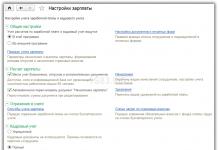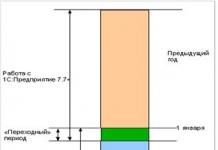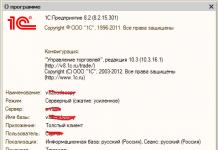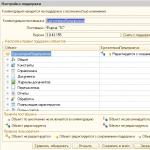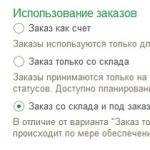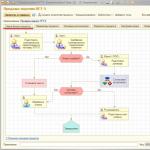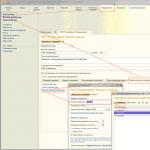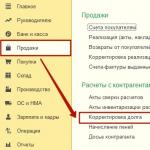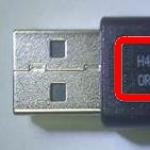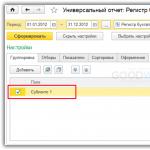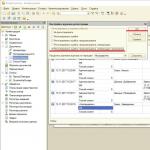Sometimes at the enterprise there is a situation of excessively withheld personal income tax from an employee. In this case, in the billing period in the document "Payroll" on the "Personal Income Tax" tab, a negative amount of tax is indicated.
Also in the document, on the “Payment adjustments” tab, the amount to be offset is indicated if the amount of tax with a minus is greater than the amount of tax accrued for the current period.
In my example, I added Pirogov P.P. the standard tax deduction for children since October, respectively, for October the program recalculated the tax and the amount turned out with a minus. Between October and November (billing month) the difference is 208 rubles, which is shown on the "Payment Adjustments" tab.

If the negative sum for October were less than the sum for November, then there would be no such difference.
When posting a document, a posting Dt 70 Kt 68.01 is generated with a negative amount.
This amount of tax will be reflected as a debt of the organization, not increasing the amount payable to the employee. Excessively withheld personal income tax will be taken into account when calculating salaries in the following months and reduce the amount of calculated tax.
If you need an excessively withheld amount of personal income tax, you can return it by issuing a document Personal income tax return in 1C Accounting 8 ed. 3.0.
To do this, go to the section "Salary and personnel", then "More" and "All documents on personal income tax". Click on the "Create" button and select the desired document "Personal income tax return".
We indicate the date of the document, if necessary, change the organization (if the database keeps records of several organizations at once).
Then, in the “Employee” field, select the employee to whom the excess withheld tax is returned.
The tabular part of the document will be filled in automatically after specifying the employee. The date of receipt of income and the amount of tax refundable at the corresponding rate will be indicated.
In our example, this is a tax at a rate of 13%.
If necessary, you can update the amounts by clicking the "Update refundable amounts" button or manually add the amounts by clicking the "Add" button.

The document "Personal income tax return" in 1C Accounting 8 ed. 3.0 does not generate postings, only the amount of the returned tax will be reflected in the tax accounting register for personal income tax.
Please note that on the basis of paragraph 4 of paragraph 1 of Art. 231 of the Tax Code of the Russian Federation and letters of the Ministry of Finance of Russia dated February 17, 2011 No. 030406/931, the return to the taxpayer of excessively withheld tax amounts will be carried out by the tax agent in a non-cash form by transferring funds to the taxpayer's bank account, which is indicated in his application.
The procedure for collecting and returning personal income tax is regulated by Article 231 of the Tax Code of the Russian Federation. Taxpayers have many questions, so we will focus on the most common cases, as well as give recommendations on how to reflect the actions for the recalculation, collection and return of personal income tax in the programs of the 1C:Enterprise 8 system.
Additional tax charge
The current rules for the collection of personal income tax have not changed. Therefore, if for some reason the tax agent did not withhold personal income tax from the income of an individual or did not withhold the tax in full, then the missing amounts must be recovered from the taxpayer. Tax underpayment can be due to the following reasons:
- by mistake, if they provided an extra deduction or incorrectly indicated the income code;
- there was a recalculation for the previous period, and income increased;
- the individual has lost its tax resident status.
If the employee continues to work, receive income, then after correcting the error, recalculating or changing the status, during the next calculation of personal income tax in the accounting programs of the 1C:Enterprise 8 system, the missing amount will be automatically calculated and the missing amount will be withheld.
If non-payment of tax is discovered when it will not be possible to withhold tax (if the employee quit or the tax period has ended), then the organization will not be able to recover personal income tax. Paragraph 5 of Article 226 of the Tax Code of the Russian Federation states that if it is impossible to withhold the calculated amount of personal income tax from the taxpayer, the tax agent is obliged to inform the taxpayer and the tax authority at the place of its registration in writing about this and about the amount of tax using a certificate of form 2-NDFL, approved by order of the Federal Tax Service of Russia dated 11/17/2010 No. ММВ-7-3/ [email protected].
To do this, it is necessary to generate a 2-NDFL certificate in the program in paper or electronic form and send it to the taxpayer and the tax authority at the place of your registration. For 2011 cases, this must be done no later than January 31, 2012.
Return of personal income tax
An overcharged tax can be for the same reasons as an underestimated tax.
The general procedure for the return and offset of overpaid and collected amounts of taxes is also established by 79 of the Tax Code of the Russian Federation. The new wording of paragraph 1 of Article 231 of the Tax Code of the Russian Federation (entered into force on January 1, 2011) clarified the rules for the return of personal income tax to an individual from whom a tax agent withheld excessive tax for any reason.
If the reason for the over-withheld tax is a changed state of deductions or income, then from the beginning of the current year, the tax agent is obliged to inform the individual, from whom he previously over-withheld tax, about each such fact within 10 working days from the date when it became known to the agent. In this case, the excess withheld amount of personal income tax is indicated. The form of the message is not regulated and can be arbitrary.
Excessively withheld amount of tax is refundable on the basis of a written application of the taxpayer (paragraph 1 of article 231 of the Tax Code of the Russian Federation). Therefore, we recommend that tax agents (employers) include a phrase in the message about the need to write such an application. It should also be indicated that the return to the taxpayer of the excessively withheld amount of tax is possible only in non-cash form. Therefore, the taxpayer's application must indicate the bank account to which the funds due to him should be transferred.
The message can be given to the taxpayer or sent by mail.
The requirement that appeared last year in the Tax Code of the Russian Federation to inform the taxpayer in a timely manner about the existing overpayment of tax is not accompanied by the regulation of fixing the fact of detection of excessive withholding of personal income tax from the taxpayer's income. The responsibility of the tax agent for not informing the taxpayer is also not provided.
Having received from the taxpayer an application for the return of the excessively withheld amount of personal income tax, the employer decides at what expense it will be returned. The refund is possible at the expense of the amounts of personal income tax to be transferred to the budget system of the Russian Federation on account of future payments both for this taxpayer and for other taxpayers, from whose income the agent withholds tax (paragraph 3, clause 1, article 231 of the Tax Code of the Russian Federation). How to make a refund is selected based on the amount of tax refunded and the deadline for its refund. The agent must return the tax to the taxpayer within three months from the date of receipt of the corresponding application from the taxpayer. Since the beginning of the current year, a tax agent has been legally granted the right to refund overpaid tax at its own expense, without waiting for the receipt of funds from the tax authority (paragraph 9, clause 1, article 231 of the Tax Code of the Russian Federation). However, the Ministry of Finance of Russia has repeatedly reminded (letters of the Ministry of Finance of Russia dated May 11, 2010 No. 03-04-06 / 9-94, dated August 25, 2009 No. 03-04-06-01 / 222) that it is necessary to return personal income tax only at the expense of tax amounts withheld from the payments of this individual.
In order to return personal income tax in 1C:Enterprise 8, you need to enter a document into the database Return of personal income tax: Desktop of the program "1C: ZUP 8"-> bookmark Taxes and contributions -> Return of personal income tax(Fig. 1).

Rice. one
Based on the posted document, money should be transferred: Menu Action -> Based on -> Salary payable(Fig. 2).

Rice. 2
But, please note - there is no responsibility for not informing about the excess withheld tax. In addition, an informed employee is not required to insist on the return of personal income tax. That is, if the employee continues to work and did not submit an application for a tax refund, then during the next personal income tax calculations in the 1C:Enterprise 8 programs, the overcharged amount will automatically be credited when calculating personal income tax. There is no prohibition in the Tax Code of the Russian Federation to continue offsetting the excess withheld tax in the next tax period. For example, an employee's personal income tax overpayment was discovered already in December. This situation will be in 2011 for employees with a third child or a disabled child. Recall that Federal Law No. 330-FZ of November 21, 2011 increased the standard deductions for personal income tax for children retroactively, i.e. from January 1, 2011.
If employees submit applications and provide documents stating that the child is disabled or the third in the family, it will be necessary to enter information about these deductions from 01/01/2011 (Fig. 3). Take advantage Assistant editing deductions for children to facilitate the replacement of deductions for third and subsequent children. Commands for calling the Assistant on the Desktop of the program "1C: Payroll and HR 8" -> tab taxes -> Editing deductions for children and on the menu Taxes and contributions.

Rice. 3
If a deduction for a disabled child has already been made, then its value will change automatically. These employees will be taxed. Employees may not have time or may not want to apply for the return of personal income tax to them. When submitting a 2-NDFL report to the IFTS, the tax agent will indicate the amount of the overpayment there. The taxpayer may not apply to the IFTS for a tax refund. A tax agent - an organization, may continue to count the amount of overpayment in the calculation in 2012. This approach is implemented in the 1C:Enterprise 8 programs.
If an overpayment of personal income tax is detected when the employee is no longer working in the organization, then the tax agent reports the overpayment of tax at the end of the tax period in the 2-NDFL report to the tax authority and notifies the taxpayer about this, and the taxpayer should receive a refund of the overdeducted amounts contact the tax office at the place of residence.
Recalculation of taxes when acquiring the status of a resident of the Russian Federation
There is an excessively withheld amount of personal income tax in the event of a change in the status of a taxpayer from a non-resident to a resident of the Russian Federation. A non-resident paid personal income tax at a rate of 30%. After an individual is recognized as a tax resident of the Russian Federation, these incomes, in accordance with paragraph 1 of Article 224 of the Tax Code of the Russian Federation, are subject to taxation at a rate of 13%.
Until 2011, such overpayments were refundable. Legislative changes have misled users. The ban on the return of overpayments of personal income tax that arose in connection with a change in the status of a taxpayer does not mean that it is not necessary to recalculate the tax at a rate of 13% and take into account the overpayment in the next accruals.
Letters of the Ministry of Finance of Russia No. 03-04-08/4-146 dated 12.08.2011 and the Federal Tax Service of Russia No. ED-4-3/9150 dated 09.06.2011 indicate that the tax agent calculates, withholds and pays personal income tax amounts to the budget system of the Russian Federation with taking into account the tax status of the taxpayer, determined on each date of payment of income. Having determined a change in the status of a non-resident to the status of a resident on a certain date, when calculating personal income tax, it takes into account the amounts that were previously accrued at a rate of 30%.
Users of 1C:Enterprise 8 programs do not need to do anything in this case. It is enough to indicate only the change in taxpayer status and the recalculation will be carried out automatically when calculating personal income tax.
Letter of the Ministry of Finance of Russia dated November 22, 2010 No. 03-04-06 / 6-273 indicates two cases in which a tax refund can only be made at the Federal Tax Service: a change in the status of a resident of the Russian Federation, a property deduction.
If an employee applies to the employer for a property tax deduction not from the first month of the tax period, the deduction is provided starting from the month of application.
Refund of excessively withheld tax can be made by the tax authority when the taxpayer submits to the inspectorate a tax declaration based on the results of the tax period.
The Ministry of Finance in its letters repeatedly indicates that those amounts of tax that were withheld in the prescribed manner before receiving the taxpayer's request for a property tax deduction and the corresponding confirmation from the tax authority are not "unduely withheld."
However, representatives of the Federal Tax Service of Russia, in a letter dated 09.06.2011 No. ED-4-3 / 9150, indicate that the return of excessively withheld tax when changing the status of a resident of the Russian Federation can be carried out by a tax agent-employer during this tax period.
In a letter from the Ministry of Finance of Russia dated September 28, 2011 N 03-04-06 / 6-242, Deputy Director of the Department of Tax and Customs Tariff Policy S.V. Razgulin answers that the above letter from the Federal Tax Service is a request to the Ministry of Finance of Russia, to which appropriate explanations have been given. And the letter of the Ministry of Finance of August 12, 2011 No. 03-04-08 / 4-146, which was issued in response to a request from the Federal Tax Service, clearly indicates that, in accordance with paragraph 1.1 of Article 231 of the Tax Code of the Russian Federation, the provisions of which came into force on January 1, 2011. , the refund of the amount of personal income tax to the taxpayer in accordance with the status of a resident of the Russian Federation acquired by him is made by the tax authority in which he was registered at the place of residence (place of stay). The refund is made when the taxpayer submits a tax return at the end of the specified tax period, as well as documents confirming the status of a tax resident of the Russian Federation in this tax period, in the manner prescribed by Article 78 of the Tax Code of the Russian Federation.
Thus, if an employee of an organization acquires the status of a tax resident of the Russian Federation, the tax refund is made at the end of the tax period by the tax authority.
Users of the 1C:Enterprise 8 programs only need to specify only the date of the change in taxpayer status, and the recalculation will be performed automatically when calculating personal income tax.
The procedure for collecting and returning personal income tax is regulated by Article 231 of the Tax Code of the Russian Federation. Taxpayers have many questions, so we will focus on the most common cases, as well as give recommendations on how to reflect the actions for the recalculation, collection and return of personal income tax in the programs of the 1C:Enterprise 8 system.
Recalculation of personal income tax: when necessary, how to reflect in "1C: Enterprise 8"
Additional tax charge
The current rules for the collection of personal income tax have not changed. Therefore, if for some reason the tax agent did not withhold personal income tax from the income of an individual or did not withhold the tax in full, then the missing amounts must be recovered from the taxpayer. Tax underpayment can be due to the following reasons:
- by mistake, if they provided an extra deduction or incorrectly indicated the income code;
- there was a recalculation for the previous period, and income increased;
- the individual has lost its tax resident status.
If the employee continues to work, receive income, then after correcting the error, recalculating or changing the status, during the next calculation of personal income tax in the accounting programs of the 1C:Enterprise 8 system, the missing amount will be automatically calculated and the missing amount will be withheld.
If non-payment of tax is discovered when it will not be possible to withhold tax (if the employee quit or the tax period has ended), then the organization will not be able to recover personal income tax. Paragraph 5 of Article 226 of the Tax Code of the Russian Federation states that if it is impossible to withhold the calculated amount of personal income tax from the taxpayer, the tax agent is obliged to inform the taxpayer and the tax authority at the place of its registration in writing about this and about the amount of tax using a certificate of form 2-NDFL, approved by order of the Federal Tax Service of Russia dated 11/17/2010 No. ММВ-7-3/ [email protected]
To do this, it is necessary to generate a 2-NDFL certificate in the program in paper or electronic form and send it to the taxpayer and the tax authority at the place of your registration. For 2011 cases, this must be done no later than January 31, 2012.
Return of personal income tax
An overcharged tax can be for the same reasons as an underestimated tax.
The general procedure for the return and offset of overpaid and collected amounts of taxes is established by Articles 78 and 79 of the Tax Code of the Russian Federation. The new wording of paragraph 1 of Article 231 of the Tax Code of the Russian Federation (entered into force on January 1, 2011) clarified the rules for the return of personal income tax to an individual from whom a tax agent withheld excessive tax for any reason.
If the reason for the over-withheld tax is a changed state of deductions or income, then from the beginning of the current year, the tax agent is obliged to inform the individual, from whom he previously over-withheld tax, about each such fact within 10 working days from the date when it became known to the agent. In this case, the excess withheld amount of personal income tax is indicated. The form of the message is not regulated and can be arbitrary.
Excessively withheld amount of tax is refundable on the basis of a written application of the taxpayer (paragraph 1 of article 231 of the Tax Code of the Russian Federation). Therefore, we recommend that tax agents (employers) include a phrase in the message about the need to write such an application. It should also be indicated that the return to the taxpayer of the excessively withheld amount of tax is possible only in non-cash form. Therefore, the taxpayer's application must indicate the bank account to which the funds due to him should be transferred.
The message can be given to the taxpayer or sent by mail.
The requirement that appeared last year in the Tax Code of the Russian Federation to inform the taxpayer in a timely manner about the existing overpayment of tax is not accompanied by the regulation of fixing the fact of detection of excessive withholding of personal income tax from the taxpayer's income. The responsibility of the tax agent for not informing the taxpayer is also not provided.
Having received from the taxpayer an application for the return of the excessively withheld amount of personal income tax, the employer decides at what expense it will be returned. The refund is possible at the expense of the amounts of personal income tax to be transferred to the budget system of the Russian Federation on account of future payments both for this taxpayer and for other taxpayers, from whose income the agent withholds tax (paragraph 3, clause 1, article 231 of the Tax Code of the Russian Federation). How to make a refund is selected based on the amount of tax refunded and the deadline for its refund. The agent must return the tax to the taxpayer within three months from the date of receipt of the corresponding application from the taxpayer. Since the beginning of the current year, a tax agent has been legally granted the right to refund overpaid tax at its own expense, without waiting for the receipt of funds from the tax authority (paragraph 9, clause 1, article 231 of the Tax Code of the Russian Federation). However, the Ministry of Finance of Russia has repeatedly reminded (letters of the Ministry of Finance of Russia dated May 11, 2010 No. 03-04-06 / 9-94, dated August 25, 2009 No. 03-04-06-01 / 222) that it is necessary to return personal income tax only at the expense of tax amounts withheld from the payments of this individual.
In order to return personal income tax in 1C:Enterprise 8, you need to enter a document into the database Return of personal income tax: Desktop of the program "1C: ZUP 8"-> bookmark Taxes and contributions -> Return of personal income tax(Fig. 1).
Rice. one
Based on the posted document, money should be transferred: Menu Action -> Based on -> Salary payable(Fig. 2).
Rice. 2
But, please note - there is no responsibility for not informing about the excess withheld tax. In addition, an informed employee is not required to insist on the return of personal income tax. That is, if the employee continues to work and did not submit an application for a tax refund, then during the next personal income tax calculations in the 1C:Enterprise 8 programs, the overcharged amount will automatically be credited when calculating personal income tax. There is no prohibition in the Tax Code of the Russian Federation to continue offsetting the excess withheld tax in the next tax period. For example, an employee's personal income tax overpayment was discovered already in December. This situation will be in 2011 for employees with a third child or a disabled child. Recall that Federal Law No. 330-FZ of November 21, 2011 increased the standard deductions for personal income tax for children retroactively, i.e. from January 1, 2011.
If employees submit applications and provide documents stating that the child is disabled or the third in the family, it will be necessary to enter information about these deductions from 01/01/2011 (Fig. 3). Take advantage Assistant editing deductions for children to facilitate the replacement of deductions for third and subsequent children. Commands for calling the Assistant on the Desktop of the program "1C: Payroll and HR 8" -> tab taxes -> Editing deductions for children and on the menu Taxes and contributions.
Rice. 3
If a deduction for a disabled child has already been made, then its value will change automatically. These employees will be taxed. Employees may not have time or may not want to apply for the return of personal income tax to them. When submitting a 2-NDFL report to the IFTS, the tax agent will indicate the amount of the overpayment there. The taxpayer may not apply to the IFTS for a tax refund. A tax agent - an organization, may continue to count the amount of overpayment in the calculation in 2012. This approach is implemented in the 1C:Enterprise 8 programs.
If an overpayment of personal income tax is detected when the employee is no longer working in the organization, then the tax agent reports the overpayment of tax at the end of the tax period in the 2-NDFL report to the tax authority and notifies the taxpayer about this, and the taxpayer should receive a refund of the overdeducted amounts contact the tax office at the place of residence.
Recalculation of taxes when acquiring the status of a resident of the Russian Federation
There is an excessively withheld amount of personal income tax in the event of a change in the status of a taxpayer from a non-resident to a resident of the Russian Federation. A non-resident paid personal income tax at a rate of 30%. After an individual is recognized as a tax resident of the Russian Federation, these incomes, in accordance with paragraph 1 of Article 224 of the Tax Code of the Russian Federation, are subject to taxation at a rate of 13%.
Until 2011, such overpayments were refundable. Legislative changes have misled users. The ban on the return of overpayments of personal income tax that arose in connection with a change in the status of a taxpayer does not mean that it is not necessary to recalculate the tax at a rate of 13% and take into account the overpayment in the next accruals.
Letters of the Ministry of Finance of Russia No. 03-04-08/4-146 dated 12.08.2011 and the Federal Tax Service of Russia No. ED-4-3/9150 dated 09.06.2011 indicate that the tax agent calculates, withholds and pays personal income tax amounts to the budget system of the Russian Federation with taking into account the tax status of the taxpayer, determined on each date of payment of income. Having determined a change in the status of a non-resident to the status of a resident on a certain date, when calculating personal income tax, it takes into account the amounts that were previously accrued at a rate of 30%.
Users of 1C:Enterprise 8 programs do not need to do anything in this case. It is enough to indicate only the change in taxpayer status and the recalculation will be carried out automatically when calculating personal income tax.
Letter of the Ministry of Finance of Russia dated November 22, 2010 No. 03-04-06 / 6-273 indicates two cases in which a tax refund can only be made at the Federal Tax Service: a change in the status of a resident of the Russian Federation, a property deduction.
If an employee applies to the employer for a property tax deduction not from the first month of the tax period, the deduction is provided starting from the month of application.
Refund of excessively withheld tax can be made by the tax authority when the taxpayer submits to the inspectorate a tax declaration based on the results of the tax period.
The Ministry of Finance in its letters repeatedly indicates that those amounts of tax that were withheld in the prescribed manner before receiving the taxpayer's request for a property tax deduction and the corresponding confirmation from the tax authority are not "unduely withheld."
However, representatives of the Federal Tax Service of Russia, in a letter dated 09.06.2011 No. ED-4-3 / 9150, indicate that the return of excessively withheld tax when changing the status of a resident of the Russian Federation can be carried out by a tax agent-employer during this tax period.
In a letter from the Ministry of Finance of Russia dated September 28, 2011 N 03-04-06 / 6-242, Deputy Director of the Department of Tax and Customs Tariff Policy S.V. Razgulin answers that the above letter from the Federal Tax Service is a request to the Ministry of Finance of Russia, to which appropriate explanations have been given. And the letter of the Ministry of Finance of August 12, 2011 No. 03-04-08 / 4-146, which was issued in response to a request from the Federal Tax Service, clearly indicates that, in accordance with paragraph 1.1 of Article 231 of the Tax Code of the Russian Federation, the provisions of which came into force on January 1, 2011. , the refund of the amount of personal income tax to the taxpayer in accordance with the status of a resident of the Russian Federation acquired by him is made by the tax authority in which he was registered at the place of residence (place of stay). The refund is made when the taxpayer submits a tax return at the end of the specified tax period, as well as documents confirming the status of a tax resident of the Russian Federation in this tax period, in the manner prescribed by Article 78 of the Tax Code of the Russian Federation.
Thus, if an employee of an organization acquires the status of a tax resident of the Russian Federation, the tax refund is made at the end of the tax period by the tax authority.
Users of the 1C:Enterprise 8 programs only need to specify only the date of the change in taxpayer status, and the recalculation will be performed automatically when calculating personal income tax.
The collection of tax on the income of an individual is determined by the requirements of Art. 231 of the Tax Code. Often, if you need to change the percentage or amount, questions arise, so we will answer the main ones here and tell you how to spend recalculation of personal income tax in 1C ZUP.
There are three main points when it may be necessary to 1C ZUP 3 personal income tax recalculation. Let's talk more about each of them.
Additional tax charge
The moment when personal income tax is incorrectly calculated may occur in the following cases:
- a banal error associated with extra deductions or an incorrectly specified expense code;
- recalculation of wages for the previous period and increase in tax, respectively;
- an individual has lost his resident status regarding the payment of taxes.
Recalculation of personal income tax in 1C 8.2 ZUP is made on the basis of familiarization of the employee with the certificate 2-NDFL.
Return of excess withheld personal income tax back
The reasons may be exactly the same as in the previous case. A message that the tax will be recalculated is sent to an individual by mail or handed over personally. At the same time, in fact, there is no liability of the tax agent for the fact that information regarding the change in the tax rate was not carried out.
In order to refund the overcharged tax, that is, to recalculate personal income tax in 1C 8.3 ZUP, you need to post the document created in the "Taxes and contributions" tab:
After you have created such a document, you need to transfer the required amount of money: Action - Based on - Salary payable.

Often the tax deduction is due to the fact that the employee did not provide data on the birth of his third child on time. In this case, you can use such an internal tool as the Child Deduction Editing Assistant, which is preinstalled in each licensed version of 1C.

We are sure that there should be no problems with carrying out such operations in 1C. Unified forms and convenient assistance will help you cope with even the most difficult case.
Upon receipt of income by an employee, the organization, as a tax agent, is obliged to calculate personal income tax from the taxable income of the employee, withhold it and transfer the withheld amount to the budget (clause 1 of article 226 of the Tax Code of the Russian Federation).
Excessively withheld personal income tax occurs in the following situations:
- The deductions are provided retroactively.
- When changing status from non-resident to resident.
- Perform any recalculations. For example, when an employee was calculated a salary for a month, and later it turned out that he was granted leave without pay.
Deductions provided retroactively
Consider how it is taken into account unnecessarily using an example when an employee wrote an application for a deduction backdated. In other cases, you need to act similarly.
For example, an employee submitted an application for a deduction not in January, but in March. The salary for January, February has already been calculated and the personal income tax has been calculated.
How to register the right to a standard tax deduction for personal income tax in 1C ZUP 3.0 (2.5), see our video:
The first version of the event: when the total amount of personal income tax for the current month is positive
In 1C 8.3 ZUP 3.0 this is how the salary calculation for January 2016 looks like: taxable income will be 16,500 rubles. and the tax on it is 2,145 rubles. A similar calculation will be for February 2016:
In March 2016, an employee writes an application for a deduction for one child:

When calculating the salary for March 2016, pay attention to the personal income tax tab. On the Accruals tab, the calculation will be the same as in January and February:

First, we see that a deduction of 1,400 rubles has been applied. (the column Applied deductions has been filled). Second, in addition to the row for March 2016, there are rows for previous months. Tax in the amount of -182 rubles. corresponds to the amount of tax that must be recalculated taking into account the deduction, i.e. 1,400 * 13% = 182 rubles Thus, in March, the personal income tax will be recalculated and the tax amounts for January and February will be taken into account. When paying wages for March, the tax will be withheld taking into account this recalculation:

In 1C 8.2 ZUP 2.5 calculation will be the same. The difference is only in how the information on deductions will be entered.
In 1C for salary accounting ed. 2.5 in order to assign deductions to an employee, you need to open an individual’s card (Desktop - Personnel records - See also - Individuals or go from the employee’s card using the link “More details about an individual ..”), execute the “NDFL” command in top command bar:

In the Data entry for personal income tax window, enter information on deductions:

When calculating the salary for March 2016, we will also see the recalculation of personal income tax for January and February 2016:

We pay wages for March, draw up a document and look at the personal income tax accumulation register, calculations with the budget. In this register with the type of movement “Expense” (“minus”), personal income tax withheld is fixed:

You can view the records that were obtained in the personal income tax register for budget settlements by clicking the Go to – personal income tax settlements with budget button in the open document Salary payable by organizations:

The second variant of the event: when the total amount of personal income tax for the current month is negative
In the examples under consideration, the amount of tax for March 2016 was enough to make the total amount of tax positive for three months. But there are situations when the amount of tax for the current month may not be enough and the tax will eventually turn out to be negative.
AT ZUP 3.0 for example, an employee Sokorina A.I. worked only one day in March, the rest of the time she took a vacation without saving salary.
Then, when calculating the salary for March 2016, she will have the following calculation:

Taxable income will be 750 rubles, personal income tax from this amount - 98 rubles. But since the employee is entitled to a deduction, it will not be applied in full, but only for 98 rubles. The rest of the amount 182 - 98 \u003d 84 rubles. will be credited to the next billing month. The amounts for January and February will also count towards the following month. Such amounts that cannot be taken into account in the current calculation appear in the Tax creditable, refundable column.
If this column is not visible in 1C ZUP 8.3, then you can enable its display using the More - Change form button. This column must always be monitored, as it keeps records of excessively withheld personal income tax. Program 1C 8.3 ZUP 3.0 keeps records of such amounts separately and does not offer them for payment:

Let's make a payment of salary for March and see that the amount payable is not increased by the amount of the excess tax withheld and is equal to 750 rubles:

Let's create a pay slip for March. The amount of excess tax withheld is recorded as a debt for the enterprise at the end of the month:

Let's look at the salary summary for March 2016, we will be interested in the personal income tax line:

As you can see, in the total amount of personal income tax (6,545 rubles) there is an amount with excessively withheld personal income tax (-448 rubles), which should not affect the withheld tax. According to the legislation, it is necessary to transfer the amount of personal income tax withheld to the budget, and in the code we see the amount of calculated personal income tax. Thus, the amount to be transferred to the budget for March should be 448 rubles. more than in the vault.
In the statement for the payment of salary, personal income tax was recorded for transfer in the amount of 6,993 rubles, which is 448 rubles. more than in the vault (6,545 + 448 = 6,993 rubles):

Let's calculate the salary for April 2016 and look at the personal income tax tab:

For employee Sokorina A.I., the excess withheld personal income tax in the amount of 448 rubles is offset. Now the sum in the column Tax payable, refundable stands with a plus sign:

In the pay slip for April, the debt is the amount, which does not include excessively withheld personal income tax. Thus, the amount of 448 rubles. was read. This is what the information displayed by “Reference” tells us about this:

We will pay employees salary for April 2016:

The amount of personal income tax according to the code was 8,708 rubles, and it is necessary to transfer the amount of 8,260 rubles, which is 448 rubles. smaller. The amount of tax withheld differs from the amount calculated exactly for the set-off amount of excessively withheld personal income tax.
If the amount of personal income tax in the summary contains negative values, then when transferring personal income tax to the budget, these amounts should not be taken into account. Accordingly, the amount in the vault and the amount when paying personal income tax will never be equal. Also, if negative amounts are offset in the next month, then the amount in the personal income tax summary will not be equal to the amount for the transfer of personal income tax to the budget.
In addition, the amount of personal income tax withheld in excess can be offset in the calculation of the next month. An employee can write a statement and he will be refunded the overtax withheld.
Change of status from non-resident to resident
If the excessively withheld personal income tax arose as a result of a change in status from a non-resident to a resident, then the tax is not refundable, but can only be credited in the calculation of the following months. If at the end of the tax period not the entire amount was credited, then the organization submits information about the excessively withheld personal income tax to the tax and the tax itself returns this amount to the employee after his appeal.
Excessively withheld personal income tax - what to do?
We will study how to return excessively withheld personal income tax in the 1C 8.3 (8.2) program for personnel.
How to return excessively withheld personal income tax in 1C ZUP 8.3 (rev.3.0)
- We form a tax refund document: section Taxes and contributions - Personal income tax refund:

- A document for the payment of salary, in which we already see that the amount is paid in the amount of 1,198 rubles (750 rubles (salary) + 448 rubles (returned personal income tax):

In the payslip we see that the amount of excessively withheld personal income tax was formed and in the same month it was set off, that is, returned and paid together in salary for March 2016:

In the case of a personal income tax return, it is necessary to manually make an entry in the register Settlements of tax agents with a personal income tax budget in order to correctly display information on personal income tax to be transferred. To do this, we will create a Data Transfers document. In setting up the composition of the registers, we will select the accumulation register Calculations of tax agents with the personal income tax budget. Fill it in as “expense” with the sum “-448.00″:

Thus, we have adjusted the information on the transferred personal income tax to the budget by the amount of the refund.
For possible errors when withholding personal income tax in 1C ZUP 3.0, see our video tutorial:
How to return excessively withheld personal income tax in 1C ZUP 8.2 (rev. 2.5)
Let's say an employee takes a vacation without saving from 03/01/16 to 03/30/16.
Thus, in March, he worked only 1 day:

We calculate his salary for March 2016 and see that the amount of personal income tax was formed with a minus sign, that is, there was an excessively withheld personal income tax:
This amount does not increase the amount payable and is stored in a separate personal income tax register for offset. You can view it by clicking on the Go button in the posted Payroll document:
In the event of an excessively withheld personal income tax, an entry with a “+” sign is placed in the register. In the pay slip for March, the debt at the end of the month is 909.45 rubles, of which 364.00 rubles - this is the amount of excessively withheld personal income tax:

The amount of excess personal income tax withheld should not increase the amount payable. As we see, having generated a document for the payment of salary for March 2016. The amount payable is 545.45 = 909.45 -364.00 rubles:

When posting the payment document, a zero amount of withheld tax is recorded, and thus there is a difference between the calculated and withheld personal income tax. We can see the calculated tax in the summary of wages or in the pay slips of employees:

In the summary for March 2016 in the amount of personal income tax calculated 1,716.00 rubles. is a negative tax amount. You need to transfer to the budget the amount withheld, that is, for March 2016. the amount of 364 rubles should be transferred. more than we see from the vault.
See the amount to be transferred for March 2016. You can use the report Analysis of accrued taxes and contributions as of the date when the salary for March was paid. In our example, this is 04/05/2016. In the personal income tax column withheld, the amount to be transferred to the budget will be indicated:

There are two possible scenarios for working with such personal income tax:
- or read out in the following months;
- or it is returned at the request of the employee.
The amount of excess personal income tax withheld is counted in the following months
Let's calculate the salary for April 2016. An employee has Novenky S.S. taxable income is 12,000 rubles - 1,400 rubles. (deduction) = 10,600 rubles. Personal income tax on this income 10,600 * 13% \u003d 1,378 rubles. - we see this on the personal income tax tab:

When carrying out this document, an entry is formed in the personal income tax accumulation register for offset, but already with the “-“ sign, that is, the amount that was previously recorded in this register with the “+” sign in March 2016 was written off by this document:
When paying salary for April, the amount “To be paid” will be 364 rubles more:

Let's generate a report Analysis of personal income tax on the date of payment of salary for April 2016 (as of May 04, 2016) and see how much it is necessary to transfer to the personal income tax budget for April 2016. And as can be seen from the report, this amount is 3,094.00 rubles. less than the amount under the vault 3 458.00 rubles. for 364.00 rubles:

If the employee wrote an application for a personal income tax refund
We create a document for the return of personal income tax: Desktop - Taxes - Return of personal income tax. When conducting this document, entries are formed in the registers.
To the personal income tax register to offset in an amount equal to the amount of the tax refund with the “-“ sign. Thus, the excess withheld tax is considered to be written off:

In the register Salary for the month of organizations, fixes the amount that will be paid to the employee:
In the personal income tax register, settlements with the budget, generates an entry with a “-“ sign, which reduces the amount of tax withheld by the amount of 364 rubles:

We pay the registered personal income tax refund:

When posting the entry document in the personal income tax register for offset, the amount of tax calculated when calculating the salary for April 2016 will already be different, since the amount was debited earlier by the personal income tax return document:

Forming the payment for April 2016, the amount is paid for 364 rubles. less than in the previous example:

Let's return to the report Analysis of accrued taxes and contributions and generate it on the date of payment. The amount of tax withheld to be transferred to the budget has not changed compared to the previous example:

In ZUP 2.5, as well as in ZUP 3.0, when returning personal income tax, there is no decrease in the amount of transferred personal income tax in the register Settlements of tax agents with a budget for personal income tax, so you have to manually adjust this amount.
The discrepancy in the amount of withheld personal income tax and personal income tax to be transferred can be seen if you generate a report Analysis of accrued taxes and contributions for the period from April to the date of payment of salary:

In order to adjust the amount to be transferred, we use the Data transfer document. We create an entry in the accumulation register Calculations of tax agents with the budget for personal income tax with the type of movement income, for the amount of returned personal income tax with a minus sign, thereby reducing the amount to be transferred:

Let's generate a report again with the same parameters and see that the amount of personal income tax withheld has become equal to the amount of personal income tax to be transferred:

Summarize. If for some reason you have excessively withheld personal income tax in the calculation, now you know how to return the excessively withheld personal income tax for its correct accounting in 1C programs.
The moment of registration of the withheld personal income tax in 1C ZUP 2.5 depends on the checkbox “When calculating personal income tax, take the calculated tax into account as withheld”. Each option, depending on whether the box is checked or not, has its own nuances that require increased attention. See our video for more on this:
In order to convey to you all the most up-to-date information on the formation of the 6-personal income tax form, to understand all the intricacies and nuances of filling out the calculation in 1C, the Profbukh8 team ( 1
ratings, average: 5,00
out of 5)
These materials are available
for viewing only registered
to subscribers of the Profbuh8.ru project
